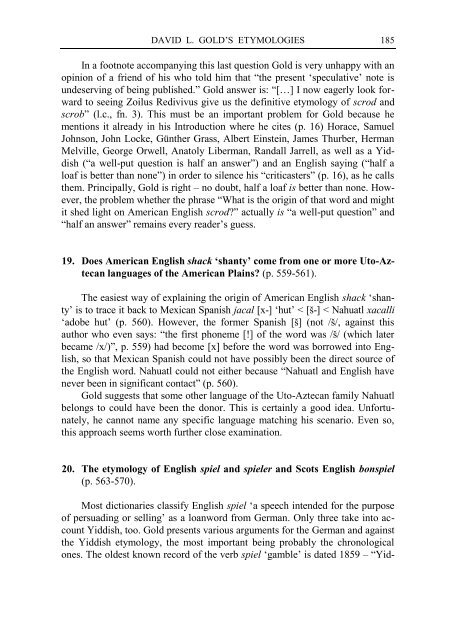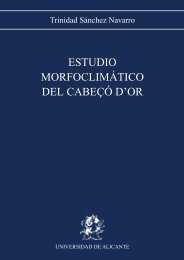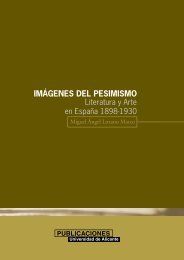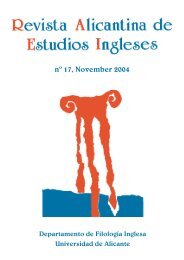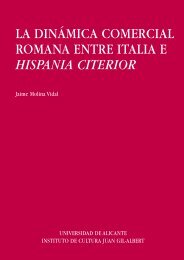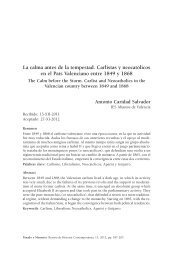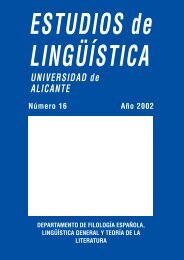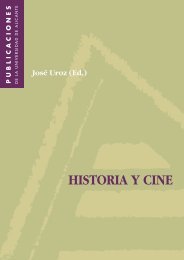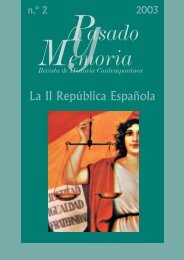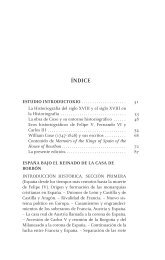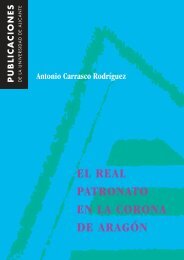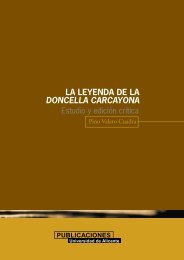DAVID L. GOLD'S ENGLISH, JEWISH AND OTHER ETYMOLOGIES ...
DAVID L. GOLD'S ENGLISH, JEWISH AND OTHER ETYMOLOGIES ...
DAVID L. GOLD'S ENGLISH, JEWISH AND OTHER ETYMOLOGIES ...
Create successful ePaper yourself
Turn your PDF publications into a flip-book with our unique Google optimized e-Paper software.
<strong>DAVID</strong> L. GOLD’S <strong>ETYMOLOGIES</strong> 185In a footnote accompanying this last question Gold is very unhappy with anopinion of a friend of his who told him that “the present ‘speculative’ note isundeserving of being published.” Gold answer is: “[…] I now eagerly look forwardto seeing Zoilus Redivivus give us the definitive etymology of scrod andscrob” (l.c., fn. 3). This must be an important problem for Gold because hementions it already in his Introduction where he cites (p. 16) Horace, SamuelJohnson, John Locke, Günther Grass, Albert Einstein, James Thurber, HermanMelville, George Orwell, Anatoly Liberman, Randall Jarrell, as well as a Yiddish(“a well-put question is half an answer”) and an English saying (“half aloaf is better than none”) in order to silence his “criticasters” (p. 16), as he callsthem. Principally, Gold is right – no doubt, half a loaf is better than none. However,the problem whether the phrase “What is the origin of that word and mightit shed light on American English scrod?” actually is “a well-put question” and“half an answer” remains every reader’s guess.19. Does American English shack ‘shanty’ come from one or more Uto-Aztecanlanguages of the American Plains? (p. 559-561).The easiest way of explaining the origin of American English shack ‘shanty’is to trace it back to Mexican Spanish jacal [x-] ‘hut’ < [š-] < Nahuatl xacalli‘adobe hut’ (p. 560). However, the former Spanish [š] (not /š/, against thisauthor who even says: “the first phoneme [!] of the word was /š/ (which laterbecame /x/)”, p. 559) had become [x] before the word was borrowed into English,so that Mexican Spanish could not have possibly been the direct source ofthe English word. Nahuatl could not either because “Nahuatl and English havenever been in significant contact” (p. 560).Gold suggests that some other language of the Uto-Aztecan family Nahuatlbelongs to could have been the donor. This is certainly a good idea. Unfortunately,he cannot name any specific language matching his scenario. Even so,this approach seems worth further close examination.20. The etymology of English spiel and spieler and Scots English bonspiel(p. 563-570).Most dictionaries classify English spiel ‘a speech intended for the purposeof persuading or selling’ as a loanword from German. Only three take into accountYiddish, too. Gold presents various arguments for the German and againstthe Yiddish etymology, the most important being probably the chronologicalones. The oldest known record of the verb spiel ‘gamble’ is dated 1859 – “Yid-


